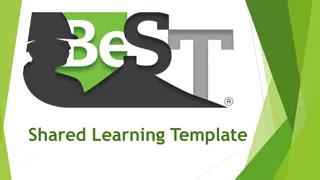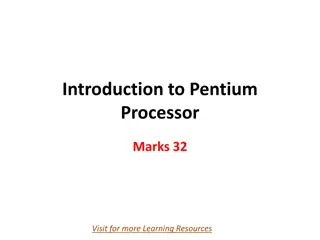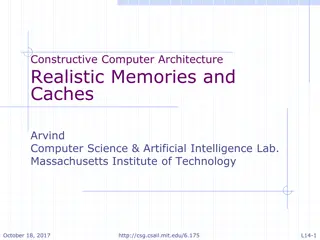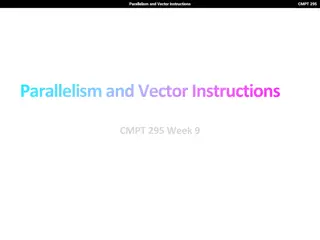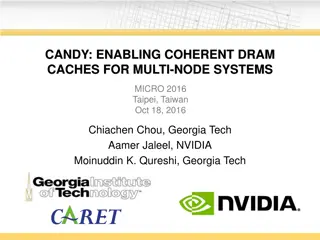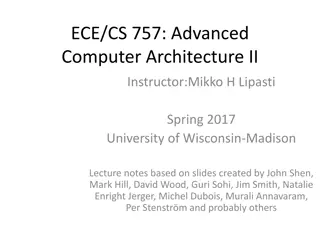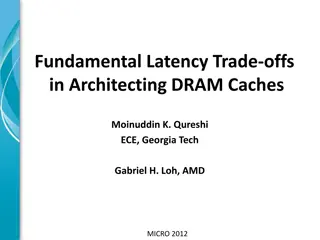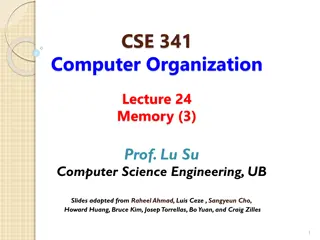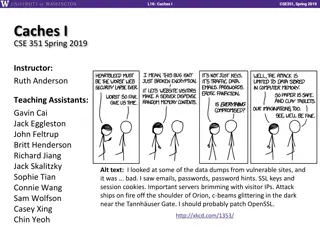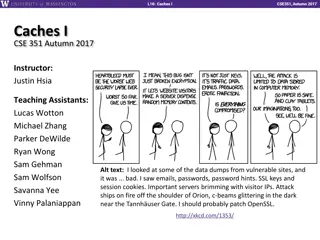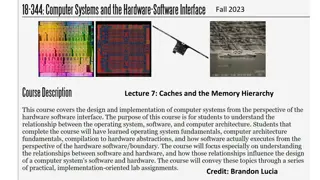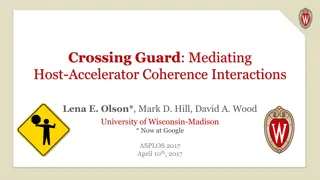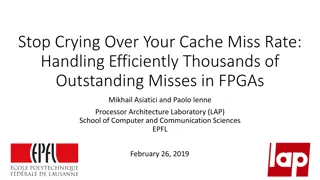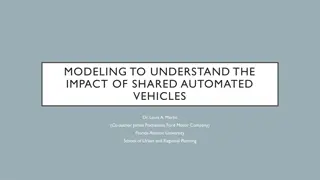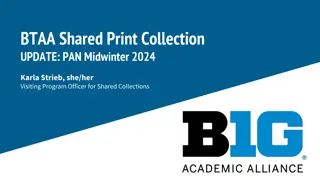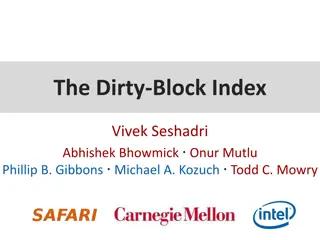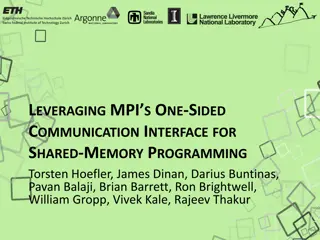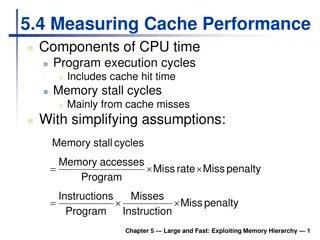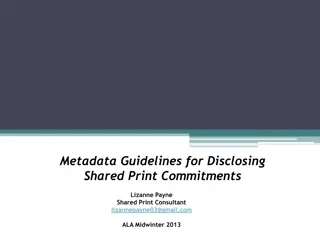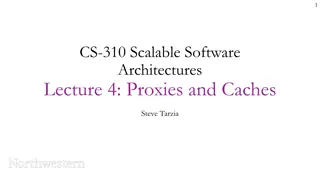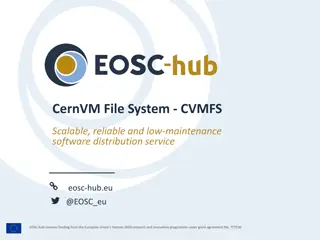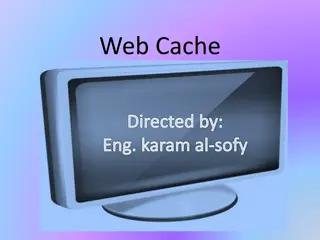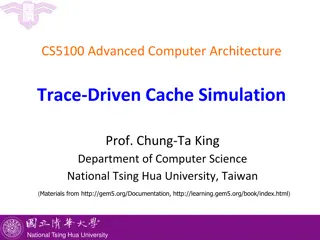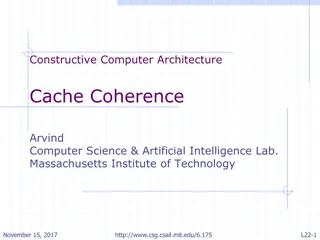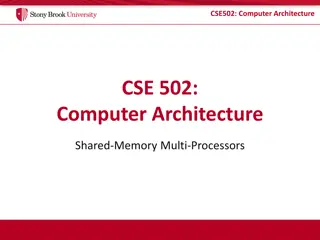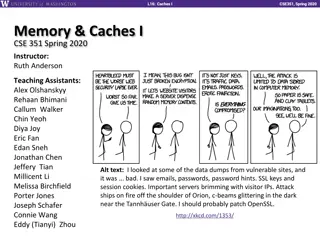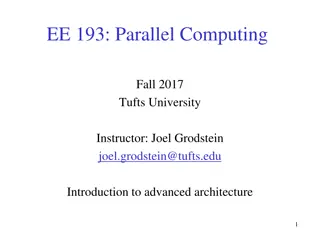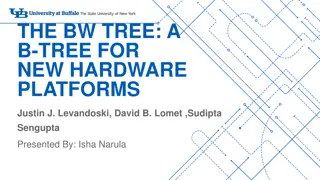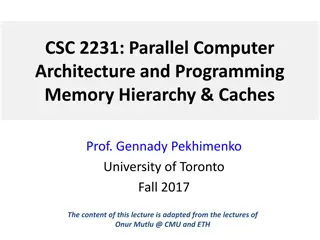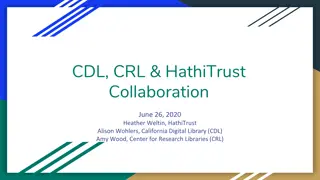Managing File System Consistency in Operating Systems
File systems in operating systems face challenges with crash consistency, especially during write operations. Issues arise when modified data in cache is lost due to system crashes or when data structure invariants are violated. Solutions like write-through and write-back caches help mitigate these
6 views • 14 slides
Enhancing Organizational Learning through BeSafe Taranaki Shared Learnings
BeSafe Taranaki Shared Learnings aims to facilitate cross-organizational learning by sharing insights from incidents and investigations. The focus is on identifying key lessons, target audiences, necessary process changes, and safety expectations. Two types of learnings are emphasized: Immediate Not
2 views • 9 slides
In-Depth Look at Pentium Processor Features
Explore the advanced features of the Pentium processor, including separate instruction and data caches, dual integer pipelines, superscalar execution, support for multitasking, and more. Learn about its 32-bit architecture, power management capabilities, internal error detection features, and the ef
0 views • 24 slides
Understanding Shared Memory Architectures and Cache Coherence
Shared memory architectures involve multiple CPUs accessing a common memory, leading to challenges like the cache coherence problem. This article delves into different types of shared memory architectures, such as UMA and NUMA, and explores the cache coherence issue and protocols. It also highlights
2 views • 27 slides
Constructive Computer Architecture Realistic Memories and Caches
Explore the realm of constructive computer architecture, realistic memories, and cache systems as presented by the Computer Science & Artificial Intelligence Lab at Massachusetts Institute of Technology. Delve into topics like 2-stage pipeline, magic memory models, and memory system views to gain in
0 views • 20 slides
Understanding Parallelism and Vector Instructions in CMPT 295
Delve into the world of parallelism and vector instructions in CMPT 295 as you explore fixed-length vector intrinsics, RISC-V concepts, computer programming fundamentals, processor execution processes, scalar and vector loops, and more. Discover the intricacies of memory, data arrays, structs, integ
1 views • 45 slides
Exploring Caching Techniques in Web Systems
Dive into the world of web caching with concepts like consistent hashing, Bloom filters, and shared caches for enhanced performance and efficiency. Discover the challenges faced in managing large-scale caches and learn about innovative solutions and ideas in the field of web systems.
0 views • 21 slides
Enhancing Multi-Node Systems with Coherent DRAM Caches
Exploring the integration of Coherent DRAM Caches in multi-node systems to improve memory performance. Discusses the benefits, challenges, and potential performance improvements compared to existing memory-side cache solutions.
0 views • 28 slides
Enhancing Memory Cache Efficiency with DRAM Compression Techniques
Explore the challenges faced by Moore's Law in relation to bandwidth limitations and the innovative solutions such as 3D-DRAM caches and compressed memory systems. Discover how compressing DRAM caches can improve bandwidth and capacity, leading to enhanced performance in memory-intensive application
0 views • 48 slides
Memory Consistency Models and Sequential Consistency in Computer Architecture
Memory consistency models play a crucial role in ensuring proper synchronization and ordering of memory references in computer systems. Sequential consistency, introduced by Lamport in 1979, treats processors as interleaved processes on a shared CPU and requires all references to fit into a global o
1 views • 64 slides
Summer Fellows 2024: Dive into OSDF Caches and IP Geolocation Challenges
Explore the Summer Fellows 2024 program focusing on topics like Glideins, IP geolocation challenges, OSDF Caches, and the use of AI in OSPool Failure Classification. Participants delve into learning the GlideinWMS system and grappling with issues related to network latency, hops, and machine learnin
0 views • 64 slides
Architecting DRAM Caches for Low Latency and High Bandwidth
Addressing fundamental latency trade-offs in designing DRAM caches involves considerations such as memory stacking for improved latency and bandwidth, organizing large caches at cache-line granularity to minimize wasted space, and optimizing cache designs to reduce access latency. Challenges include
0 views • 32 slides
Understanding Cache Memory Organization in Computer Systems
Exploring concepts such as set-associative cache, direct-mapped cache, fully-associative cache, and replacement policies in cache memory design. Delve into topics like generality of set-associative caches, block mapping in different cache architectures, hit rates, conflicts, and eviction strategies.
0 views • 35 slides
CSE351 Spring 2019 - Caches and Memory Concepts
Exploring the intricacies of caching in CSE351 Spring 2019, delving into memory management, data structures, assembly language, Java comparisons, and mnemonic aids. The course covers practical applications and theoretical underpinnings, including memory allocation, virtual memory, and processor cach
0 views • 31 slides
CSE351 Autumn 2017: Caches Instructor and TA Information
The content provides information about the CSE351 course on caches for Autumn 2017, including details about the instructor, teaching assistants, administrative updates, midterm policies, course roadmap, units and prefixes, mnemonic techniques, and execution time analysis. It also includes important
0 views • 31 slides
Understanding Caches and the Memory Hierarchy in Computer Systems
Delve into the intricacies of memory hierarchy and caches in computer systems, exploring concepts like cache organization, implementation choices, hardware optimizations, and software-managed caches. Discover the significance of memory distance from the CPU, the impact on hardware/software interface
0 views • 84 slides
Enhancing Accelerator-Host Coherence with Crossing Guard
Explore the need for coherence interfaces in integrating accelerators with host protocols, addressing complexities and safety concerns, emphasizing customizable caches and standardized interfaces for optimal performance and system reliability.
0 views • 55 slides
Introduction to Boston University's Shared Computing Cluster
Boston University's Shared Computing Cluster (SCC) provides researchers with access to a high-performance computing environment for running code, collaborating on shared data, and utilizing specialized software packages. With over 800 nodes, 20,000 processors, and hundreds of GPUs, the SCC offers re
0 views • 63 slides
Efficient Handling of Cache Miss Rate in FPGAs
This study focuses on improving cache miss rate efficiency in FPGAs through the implementation of non-blocking caches and efficient Miss Status Holding Registers (MSHRs). By tracking more outstanding misses and utilizing memory-level parallelism, this approach proves to be more cost-effective than s
0 views • 44 slides
Impact of Shared Automated Vehicles on Transportation System Performance
This study by Dr. Louis A. Merlin and James Fischelson explores the potential impact of shared automated vehicles on transportation systems. By reviewing 39 papers and simulations, the research delves into the implications of new shared automated modes, such as automated taxis, shuttles, and shared
0 views • 38 slides
Transforming Big Ten Libraries through Shared Print Collections and Collective Action
Aspiration for a tremendous vision to unite Big Ten university collections into one shared and fully networked "BIG Collection." This initiative aims to increase findability, usability, and value at scale while deepening interdependence and resilience for an uncertain future. The Knowledge Commons w
1 views • 10 slides
Debate on Shared Sanitation: Improved or Not?
The discussion revolves around the classification of shared sanitation as improved or unimproved. WHO and UNICEF have a classification system where shared sanitation is considered unimproved due to concerns about cleanliness and accessibility. A proposed policy change by JMP seeks to include shared
0 views • 22 slides
Efficient Cache Management using The Dirty-Block Index
The Dirty-Block Index (DBI) is a solution to address inefficiencies in caches by removing dirty bits from cache tag stores, improving query response efficiency, and enabling various optimizations like DRAM-aware writeback. Its implementation leads to significant performance gains and cache area redu
0 views • 44 slides
Leveraging MPI's One-Sided Communication Interface for Shared Memory Programming
This content discusses the utilization of MPI's one-sided communication interface for shared memory programming, addressing the benefits of using multi- and manycore systems, challenges in programming shared memory efficiently, the differences between MPI and OS tools, MPI-3.0 one-sided memory model
0 views • 20 slides
Understanding Cache Performance Components and Memory Hierarchy
Exploring cache performance components, such as hit time and memory stall cycles, is crucial for evaluating system performance. By analyzing factors like miss rates and penalties, one can optimize CPU efficiency and reduce memory stalls. Associative caches offer flexible options for organizing data
0 views • 22 slides
Metadata Guidelines for Disclosing Shared Print Commitments
Shared Print Metadata Guidelines aim to establish new Shared Print Institution Symbols and add them to bibliographic records for resource sharing. These guidelines involve creating MARC Local Holdings Records (LHRs) to document archiving commitments for journals. The Shared Print initiative supports
1 views • 12 slides
Proxies, Caches, and Scalable Software Architectures
Statelessness, proxies, and caches play key roles in creating scalable software architectures. The lecture explains the concepts of proxies and caches, highlighting their functions in enhancing performance and scalability. Proxies act as intermediaries for requests, while caches store frequently acc
0 views • 13 slides
Introduction to CernVM File System (CVMFS)
CernVM File System (CVMFS) is a scalable, reliable, and low-maintenance software distribution service used by various computing communities. It was developed to support High Energy Physics (HEP) collaborations and has since been adopted by other fields like Medical, Space, and Earth Sciences. Using
0 views • 16 slides
Understanding Web Caching: An Overview
Web caching, implemented through various types of caches like browser cache, proxy cache, and gateway cache, plays a crucial role in improving content availability, reducing network congestion, and enhancing user experience by saving bandwidth and decreasing latency. It addresses the challenges pose
0 views • 27 slides
Trace-Driven Cache Simulation in Advanced Computer Architecture
Trace-driven simulation is a key method for assessing memory hierarchy performance, particularly focusing on hits and misses. Dinero IV is a cache simulator used for memory reference traces without timing simulation capabilities. The tool aids in evaluating cache hit and miss results but does not ha
0 views • 13 slides
Understanding Cache Coherence in Computer Architecture
Exploring the concept of cache coherence in computer architecture, this content delves into the challenges and solutions associated with maintaining consistency among multiple caches in modern systems. It discusses the importance of coherence in shared memory systems and the use of cache-coherent me
0 views • 24 slides
Understanding Computer Architecture: Shared Memory Systems
Shared memory multiprocessors in computer architecture involve multiple threads using shared memory for communication, with synchronization complexities and implicit communication challenges. Despite these drawbacks, Shared Memory Systems have proven to be successful machines due to their evolutiona
0 views • 40 slides
Memory and Caches in CSE 351 Spring 2020: Insights and Roadmap
Exploring the world of memory and caches in CSE 351 Spring 2020 led by Instructor Ruth Anderson and her dedicated team of Teaching Assistants. Discover the essential topics covered such as data integers, x86 assembly, processes, and more. Dive into the nuances of memory allocation, Java implementati
0 views • 30 slides
Enhancing Key-Value Store Efficiency with SwitchKV
Explore how SwitchKV optimizes key-value store performance through content-aware routing, minimizing latency, and enabling efficient load balancing. By leveraging SDN and switch hardware, SwitchKV offers a fast, cost-effective solution for dynamic workloads in modern cloud services, overcoming chall
0 views • 16 slides
Understanding Advanced Computer Architecture in Parallel Computing
Covering topics like Instruction-Set Architecture (ISA), 5-stage pipeline, and Pipelined instructions, this course delves into the intricacies of advanced computer architecture, with a focus on achieving high performance by optimizing data flow to execution units. The course provides insights into t
0 views • 12 slides
Understanding Web Caching, Proxies, and CDNs in Web Architecture
This comprehensive guide delves into the concepts of web caching, proxies, and CDNs, explaining their importance in web architecture. It covers topics such as caching mechanisms, browser cache management, what can be cached, and controlling caches with HTTP headers. The provided images visually illu
1 views • 42 slides
Intelligent DRAM Cache Strategies for Bandwidth Optimization
Efficiently managing DRAM caches is crucial due to increasing memory demands and bandwidth limitations. Strategies like using DRAM as a cache, architectural considerations for large DRAM caches, and understanding replacement policies are explored in this study to enhance memory bandwidth and capacit
0 views • 23 slides
Revolutionizing Data Storage: The BW-Tree Architecture for Modern Hardware Platforms
The BW-Tree presents a novel latch-free approach for high-performance data management on modern hardware. By leveraging processor caches and implementing log-structured storage, it offers efficient data organization and management. The architecture ensures thread efficiency and cache preservation, t
0 views • 37 slides
Understanding Memory Hierarchy in Parallel Computer Architecture
This content delves into the intricacies of memory hierarchy, caches, and the management of virtual versus physical memory in parallel computer architecture. It discusses topics such as cache compression, the programmer's view of memory, virtual versus physical memory, and the ideal pipeline for ins
1 views • 86 slides
Collaboration for Shared Print Collections: Vision, Mission, and Principles
This collaboration between HathiTrust, CDL, and CRL aims to enhance access to shared print collections, promote equity in scholarly resources, and leverage networks for collaborative infrastructure. The vision includes embedding shared print in library collections, enriching the scholarly record, an
0 views • 10 slides

